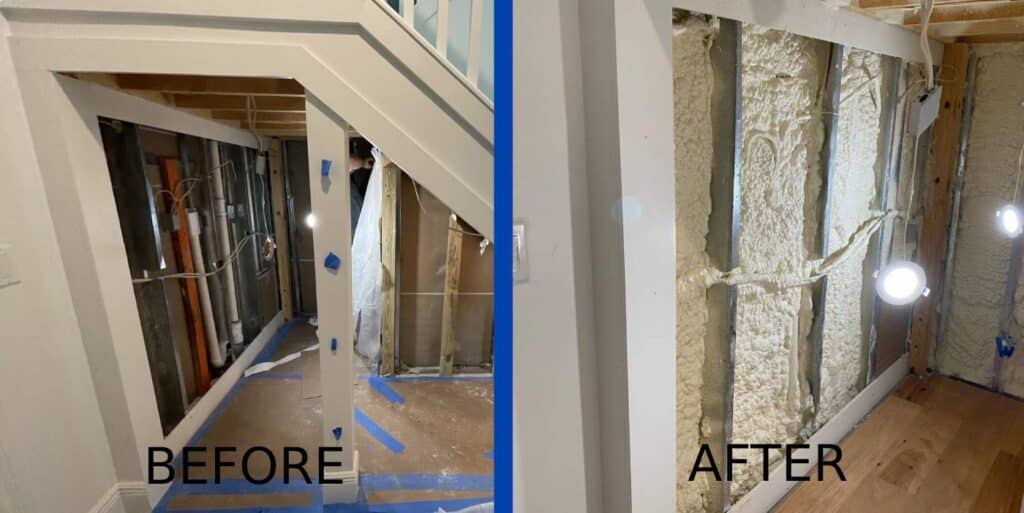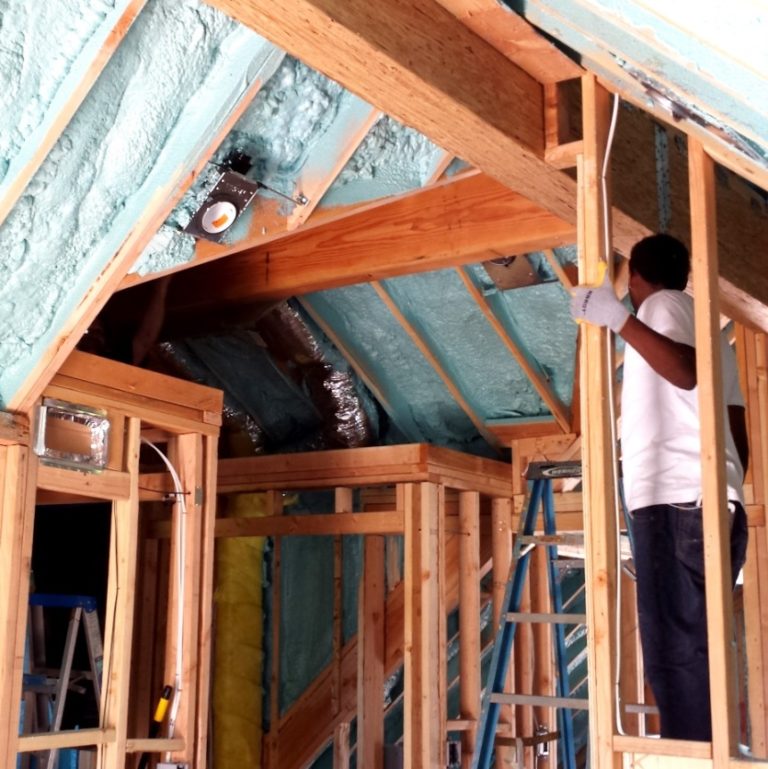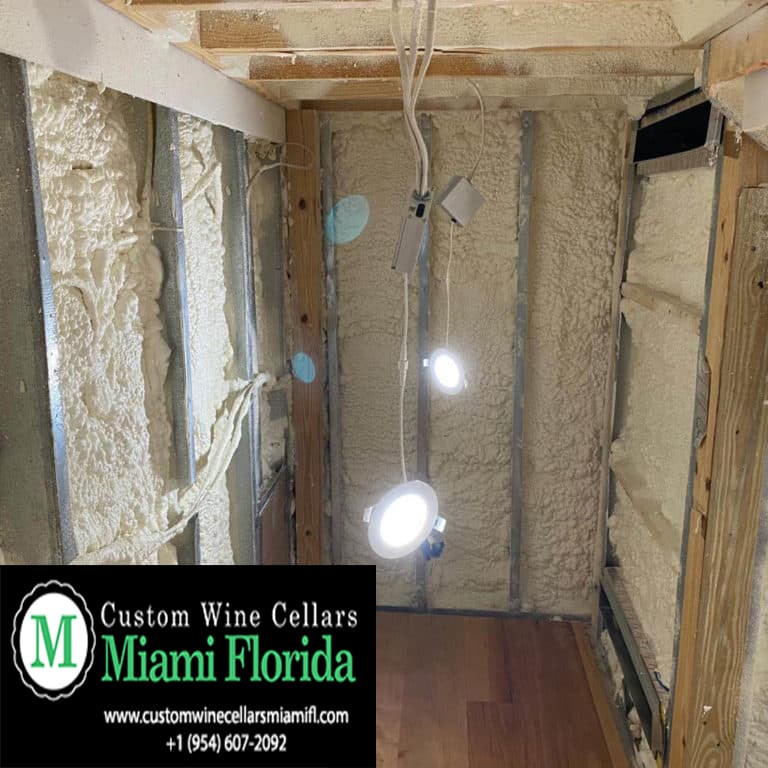The appropriate wine storage is crucial for maintaining its flavor, aroma, and overall quality. Factors such as temperature, humidity, light, and vibration significantly impact the preservation of wine. Custom Wine Cellars Miami Florida, a renowned industry expert in Pinecrest, Biscayne and surrounding areas, offers specialized services in designing and installing custom wine cellar designs with innovative wine storage solutions.

Spray foam insulation works wonders in keeping your wine cellar optimized for effective wine storage.
Through personalized consultations and swift quotes, Custom Wine Cellars Miami Florida ensures that clients receive the most efficient wine storage solutions, such as spray foam insulation for optimal temperature control.
Understanding the Importance of Proper Wine Storage
Temperature variations can lead to wine expansion and contraction, resulting in cork displacement or air infiltration. Consequently, this may cause oxidation, which can spoil the wine. For optimal storage conditions, it is recommended to maintain temperatures between 55°F and 59°F (13°C – 15°C).
Humidity levels are equally vital in preserving wine. Insufficient humidity levels could result in cork dehydration and subsequent air entrance into the bottle. On the other hand, excessive humidity could promote mold growth on both the cork and label. Hence, ideal humidity levels for wine storage should range from 50% to 70%.
Light exposure also has a significant effect on wine quality. Ultraviolet (UV) light may trigger chemical reactions that alter the wine’s taste and scent profile. This explains why dark bottles often contain wines and should be stored in dimly lit areas.
Vibrations pose another risk to maintaining optimal wine quality by disrupting sediment within the bottle. Such disturbances could render the liquid cloudy and negatively affect its flavor properties.
The Benefits of Spray Foam Insulation for Wine Storage

One of our partners in Wine Cellars Designer Group applying spray foam for a client’s custom wine cellar.
Utilizing spray foam insulation in wine cellars and wine storage facilities offers numerous advantages, primarily due to its exceptional insulating characteristics. This material aids in maintaining a stable temperature within the wine cellar, effectively mitigating air leaks that could lead to fluctuations.
Furthermore, the moisture-resistant properties of spray foam insulation contribute significantly to humidity control, thereby inhibiting mold growth and ensuring cork preservation.
How Spray Foam Insulation Works
Spray foam insulation, made from polyurethane, is applied as a liquid and expands to fill gaps or cracks when sprayed into place. This creates an airtight seal that’s excellent for preventing air leaks.
The installation involves using specialized equipment to spray the foam, which then expands and hardens. It’s a versatile solution for insulating wine cellars, as it can be customized to meet specific requirements.
For instance, one can choose various thicknesses of foam depending on their insulation needs. This adaptability makes spray foam insulation popular for maintaining ideal conditions within wine cellars.
Comparing Spray Foam Insulation to Other Insulation Options
Regarding insulating wine cellars, various options are available, such as fiberglass batts and rigid foam boards. However, spray foam insulation stands out due to its numerous advantages over the alternatives.
One significant benefit of spray foam insulation is its higher R-value per inch compared to other materials. This means it’s more effective in providing insulation with less thickness needed. Plus, it creates its own vapor barrier upon application, eliminating the need for a separate one.
Not only is spray foam insulation efficient, but it’s also cost-effective in the long run. It lasts longer than other materials and requires minimal maintenance, making it a smart choice overall.
Making the Switch to Spray Foam Insulation
If you’re considering switching to spray foam insulation for your wine cellar, it’s essential to evaluate your wine storage needs first. Determining the appropriate amount of insulation for your cellar space is also necessary.
Next, selecting the correct type of spray foam insulation is crucial. Various options are available, so pick one that fulfills specific requirements.
Lastly, partnering with an experienced professional wine cellar installer will guarantee proper installation and maximum benefits from the chosen spray foam insulation. This collaboration ensures top-notch results for any wine cellar project.
The Two Types of Spray Foam Insulation for Your Wine Cellar

Spray foam insulation is an airtight solution to maintain optimal humidity and temperature in your wine cellar.
You can opt for spray foam insulation to effectively preserve your wine cellar’s temperature and humidity. Choose between open-cell or closed-cell foam types, both offering a seamless blend of professionalism and casual vibes.
Open-Cell Spray Foam Insulation
Open-cell spray foam insulation offers a pliable and less dense alternative to closed-cell foam. Though it has a lower R-value per inch, it will effectively insulate your wine cellar space. Commonly used in interior walls and attics, open-cell foam permits some air circulation, making it ideal for these areas.
Closed-Cell Spray Foam Insulation
Closed-cell spray foam insulation offers a robust, dense solution with a superior R-value per inch compared to its open-cell counterpart. With excellent insulation and air sealing, this foam is ideal for exterior walls and moisture-sensitive areas due to its effective vapor barrier properties.
Both types of spray foam insulation have their advantages and can be equally effective for insulating wine cellars. The type of spray foam insulation you select will depend on your specific needs and the conditions you want to achieve in your wine cellar.
Discover Your Dream Wine Closet with Custom Wine Cellars Miami Florida: The Best in Design and Construction Services
If you also live in Edgewater, Brickell, Coconut Grove, South Beach, Key Biscayne, or South of Fifth in Miami, FL, we can construct the perfect wine closet for your home. Custom Wine Cellars Miami Florida also offer services ranging from creating wine closet racks to managing the entire planning and construction process. Get your custom wine cellar optimzied with spray foam insulation with us by contacting us at +1 (305) 517-7353.
